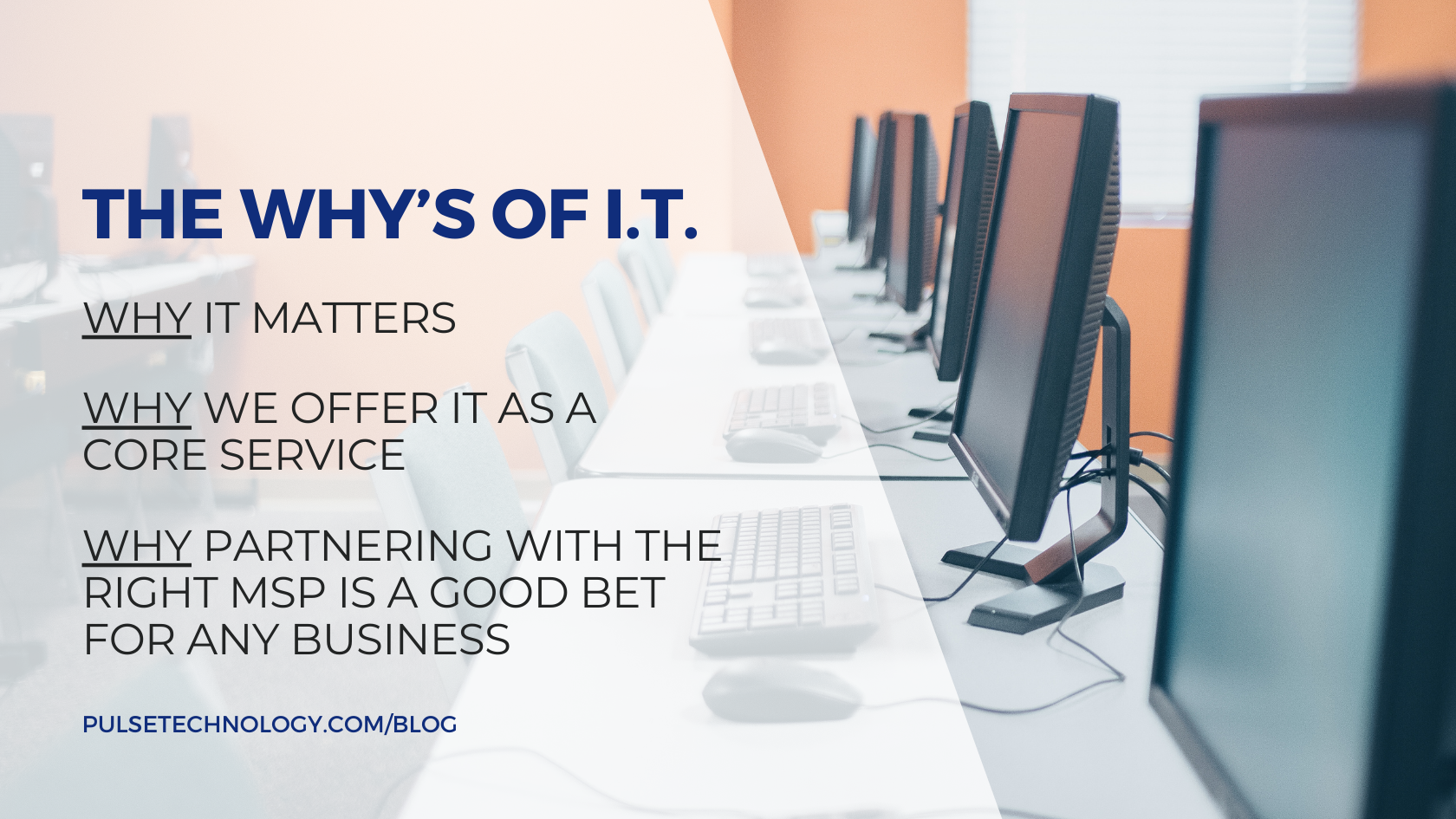Signs that your business needs an MSP
A Globe Newswire article predicts that by 2025 at least 60% of organizations worldwide will have some dependence on MSPs (Managed Service Providers), and that the industry will reach annual revenues of $393.72 billion. That’s very significant give that, relatively speaking at least, it’s a new industry. The concept of MSP was seen in the 90s, but it is really in the 2000s and after that the industry has come into prominence.
Tech Target Network defines a Managed Service Provider (MSP) as a third-party company that remotely manages a customer's information technology (IT) infrastructure and end-user systems. Increasingly, this is seen as “the way to go” for companies to stay ahead of the challenges of maintaining and protecting valuable data and infrastructure at a time when cyber criminals show no signs of slowing down. Companies previously relied on the “break-fix” model, meaning that they would call in an expert if they had a specific problem. As cyber attacks have become more commonplace, though, companies are seeing the value of having an MSP partner.
Zippia.com in fact provides some daunting statistics:
- Cyberattacks happen once every 39 seconds.
- 95%of cyberattacks are due to human error.
- Cybercrime cost people in the United States an estimated $6.9 billionin 2021.
- Globally, an estimated 30,000 websitesare hacked each day.
- 43%of Cyberattacks target small businesses.
- Only 5%of company folders and files are properly protected.
That last statistic – that only 5% of company folders and files are properly protected – is perhaps the most compelling reason why every company should have a Managed Services Provider (MSP). We’ll detail some other reasons in a minute.
MSPs provide a range of valued services to small and medium-sized businesses (and non-profit organizations also) which include network and infrastructure management, security and monitoring, and training of employees – where the majority of breaches occur (human error).
The same report shows that data breaches jumped 68% on 2021 over 2020, and that cybercriminals are focusing increasingly on smaller businesses. And mobile phones now account for 60% of cyber fraud.
As company networks become increasingly complex, the idea of “going it alone” or even trying to find a provider who will operate under the “break/fix” model becomes less and less of a viable option. Using an MSP will provide a business or non-profit organization with the assurance and peace of mind that someone is proactively watching over its network and infrastructure.
Using an MSP can help an organization save on costs, improve its efficiencies, and frequently give a company a chance at having the best of class resources at its disposal. MSPs frequently have tools and processes that they can use to help their clients. Many organizations may have an internal IT person on staff who can work with the outside MSP to achieve the best results.
Is an MSP right for your business? What are the reasons that a company should partner with an MSP? Your company should partner with an MSP if any of the following apply to you:
- Your company does not have a dedicated IT person, or team. Many companies do not have this resource, or they m may have someone who doubles as an IT person and a technician, for example.
- Or you do have a dedicated IT person but have worried about what will happen if this person seeks employment elsewhere. And this person always seems to be stretched thin, time-wise.
- You do not have anyone on staff who is constantly researching the latest software, patches, and protection.
- You do not have someone who is staying up to speed on the newest cyber scams. Security Magazine states that there are over 2,200 attacks each day which breaks down to nearly one cyberattack every 39 seconds.
- You do not have a person dedicated to cyber training of employees. Remember, 90% of hacks can be traced to human error.
- Your organization experiences occasional or continuous technical problems.
- In the “once is once too many times” category, you experience down time because of technical or cyber problems.
- You do not have a specific knowledge of all the devices that access your network.
- You are uncertain about the actual expenses involved in maintaining your infrastructure, and have encountered expensive break-fix contracts
- You experience difficulties in staying compliant.
- Your system has poor network performance.
- You feel that you are always in a “reactive” rather than “proactive” when it comes to repairs and maintenance.
Staying up to speed with changes in software and the latest threats can feel like a full-time job. Shouldn’t your time be spent on growing your business not worrying about your IT?
Take IT off your to-do list.  or give us a call (888) 357-4277
or give us a call (888) 357-4277



